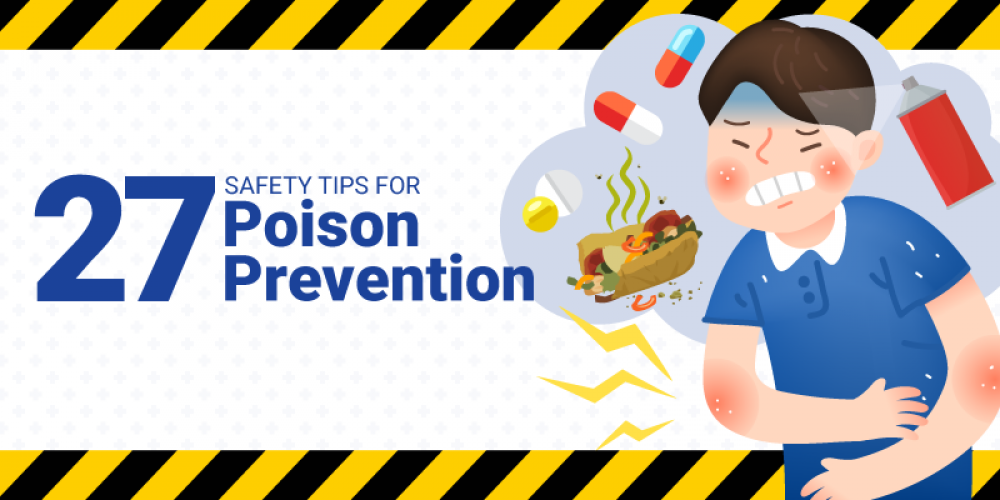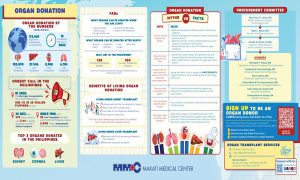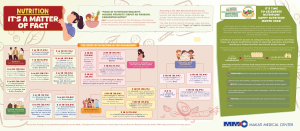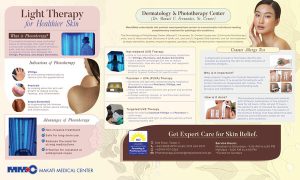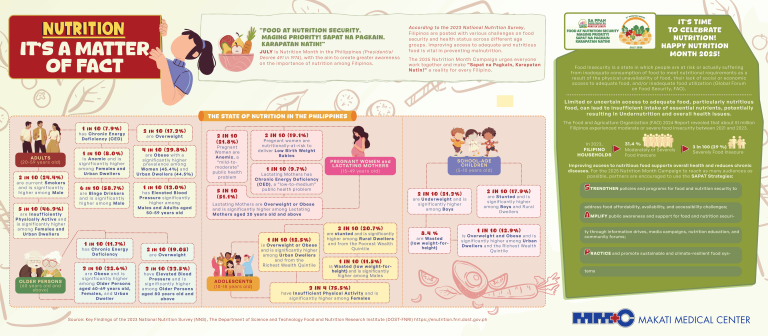Many common household products can be poisonous if unintentionally consumed or used in the wrong way. Something as ordinary as household cleaners, painkillers, leftover food, or alcoholic drinks can pose as poison risks.
Learning about these products at home can help keep everyone safe, especially children. Properly store food and read the directions and warning labels of products to avoid a trip to the Emergency Room (ER).
Knowing the risks and educating families about poison prevention are essential. Take a look at the visual guide below to find out more about poisoning, along with some safety tips to protect the family.
How to Prevent Poisoning
2. Do not take larger or more frequent doses of medication than prescribed or needed. Taking more than necessary will not bring faster or more powerful effects. Follow the instructions given by your doctor.
3. Keep prescription drugs out of children’s reach. Kids may climb up cupboards using a stool and reach countertops to take items stored away from them. Make sure certain harmful substances are out of their sight so they would not be tempted to find the products.
4. Keep medicines in their original containers and put proper labels. Do not transfer medicines, especially prescription medications, in a different container. The original container includes vital information about the drug (e.g., dosage, side effects information, and directions of use).
5. Dispose of unused and expired medications. When disposing of medicines, remove them from the original containers and mix them with something unpleasant like coffee grounds, then put in a resealable storage bag. Some medications that could be harmful to others have specific directions to flush them down the sink or toilet when no longer needed.
6. Read all warning labels. Follow the directions when giving or taking medicines. Keep in mind that some medicines are not safe to take together (e.g., antihistamines and motion-sickness medications) or when drinking alcohol.
7. Never share prescription drugs. Exhibiting the same symptoms as someone is not a valid reason to ask for some of their medicine to see if it will work. Do not share prescribed medication to anyone.
8. Monitor the use of medicines prescribed for children and teenagers. Supervise children when taking medicines and make sure that they take only the proper doses. Also, follow family rules in storing medicines.
10. Never mix household chemicals. Since cleaning products or other chemicals are already potent on their own, combining them may be dangerous. For instance, mixing bleach and ammonia may cause a release of toxic chloramine gas.
11. Secure storage spaces for toxic chemicals. Designate safe and secure storage spaces for cleaning products and other household chemicals that are away from the pantry and out of reach of children.
12. Use safety latches for cabinets containing cleaning products and other chemicals. Have an extra layer of security from curious children. Never underestimate their ability to climb, open, or get their hands on these products.
13. Do not use insect spray on furniture. In the same vein, avoid spraying pesticides and similar products to surfaces commonly touched by family members, such as the sofa and dining table. Doing so may be unsafe for children and even pets.
14. Always read the label before using a product. Read the label and directions on how to use the product properly.
15. Wear protective clothing when spraying pesticides or other chemicals. Strong acids are present in cleaning chemicals. Wearing gloves and safety glasses can avoid damage to the skin and eyes.
16. Make sure the areas are well-ventilated. Turn on the fan and open the windows when using household cleaners and other chemical products.
17. Wash hands thoroughly after handling chemicals. Decontamination is a must after handling toxic chemicals to avoid accidents. Wash hands thoroughly to remove any traces of toxic products that may lead to ingestion, inhalation, or any contact with sensitive areas of the body.
19. Clean dishes and kitchen utensils that have had contact with raw meat, poultry, and eggs. Much like when washing hands, make sure to clean the kitchen utensils and dishes after using it for raw meat, poultry, and eggs. Use separate chopping boards to avoid contamination that may be present in raw food.
20. Do not eat spoiled food. Whether home cooked or not, always examine the food before eating it to see if there are signs of molds or strange odors. Consuming spoiled food can cause vomiting, diarrhea, and even fever—the symptoms of food poisoning.
21. Make sure the food is well-packaged. Do not consume expired foods or packaged foods with a broken seal or in cans that have a dent or bulge. Before purchasing, always check the best-before date of the products and make sure that they are well-stored.
22. Do not consume foods that emit an unusual odor or spoiled taste. For leftovers, smell or taste the food first to check if it has gone bad.
23. Keep raw meat separate from ready-to-eat foods. Ready-to-eat foods like salad, bread, and fruit don’t require cooking before being consumed, so any bacterial contamination coming from raw meat poses a risk.
24. Do not leave raw meat and fish at room temperature. Raw meat and fish can spoil faster when left at room temperature. Store in a fridge or cooler if they will be transported.
25. Cook food thoroughly. When cooking pork, sausages, poultry, and burgers, make sure to cook until they are fiery hot. The best way to kill all bacteria from raw meat is to cook them thoroughly, so aim for an internal temperature of 75C or hotter
26. Refrigerate leftovers. This is done to preserve the freshness of food. Likewise, refrigerate leftovers from restaurants immediately.
27. Monitor stored food or leftovers. Food and leftovers have specific shelf lives, so make sure they are consumed before the date and disposed of when they are stored beyond it.
First-Aid Procedure
If someone shows signs of poisoning, here’s what to do until help arrives.
- For swallowed poisons, drink a small amount of milk or water. If the product ingested is burning, caustic, or irritating, drink a glass of water or milk immediately to dilute the swallowed product and delay its harmful effects.
- If eyes are affected, immediately wash them with running water. Rinse the eyes with room temperature water for 10 to 15 minutes. Let the gentle stream of water flow from the inner corner of the eye across the outer corner.
- If poison is inhaled, move the person to an area with fresh air. Immediately lead the affected person outside for fresh air and loosen any tight clothing around the neck. If indoors, open the doors and windows.
- If the skin is affected, remove any contaminated clothing using gloves, then rinse the skin. Use gloves to carefully remove contaminated clothing and rinse the affected skin with room temperature water.
- Keep the pill bottle or container and gather any related information about the poison. Be ready to describe the symptoms, determine the amount ingested, and the length of time of the exposure. Bring the object or product that may have caused it, if possible, for reference to the medical professional.
- Make sure to call emergency services immediately when it is safe to do so. Make sure the patient is out of danger, so you can immediately call emergency services for professional help.
If you suspect poisoning or if someone has been exposed to a poison, call for immediate help.
Spread Awareness to Prevent Poisoning
Poisoning must not be taken lightly. There are different levels of toxicity, but it can be dangerous if not treated immediately. A serious case of poisoning can be a cause of admission and treatment in the intensive care unit (ICU). Hopefully, the safety tips above can help poison-proof homes and keep families free from the risks.
For emergencies involving poisoning, contact Makati Medical Center for assistance and immediate treatment.

